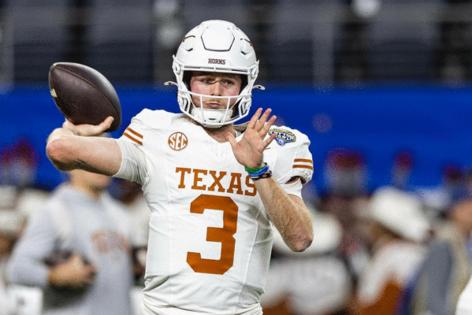Mac Engel: Lesson learned? How Shedeur Sanders and Quinn Ewers blew it by turning pro.
Published in Football
FORT WORTH, Texas — The old Yiddish saying goes, “Man Plans, and God Laughs,” and there’s another one somewhere that says, “Quarterback Dads Make Plans, and the NFL Laughs Much Harder.”
For the first time in his life, having Deion Sanders as his father worked against Shedeur Sanders.
For the first time since he was a freshman at Ohio State, Quinn Ewers is not that special, and thought less of than Tyler Shough.
The respective ex-starting quarterbacks at the University of Colorado and the University of Texas discovered over the weekend what turning pro can really look like, and that there’s a reason why so many adults say, “Stay in college for as long as you can.”
Since they were playing high school ball in Dallas-Fort Worth, both young men followed plans hatched by their dads. The then-teenagers were going to be great high school players who attended top college programs, and made a lot of money in the new unregulated world of NIL. Then they would leave college with a year of eligibility remaining, and be selected early in the first round of the 2025 NFL draft.
All of it happened, except ...
Shedeur Sanders & Quinn Ewers were on the same path
Less than one year ago both players were projected to be top quarterbacks selected in the ‘25 draft; on draft night they would celebrate on live television with family and loved ones about the culmination of a dream.
On Day 3 of this draft, with few watching, Sanders was picked in the fifth round at No. 144 by Cleveland, and Ewers at No. 231 by Miami. Ewers was 24 slots away from being Mr. Irrelevant.
Neither warrants a tear, nor a drop of sympathy. Both Ewers and Sanders are the children of privilege who made seven figures during their respective college careers to play football. They earned it. They’re lucky. They’re fine.
And they will be fine, unless one or both drops the brain out of their respective heads. They’re not victims.
They also got bad advice, and listened to biased “advisors” who refused to see beyond their own arrogance, and tunnel vision, or sunglasses.
Ewers & Shedeur will take pay cuts to play in the NFL
There is no way around the uncomfortable reality that NFL teams wanted no part of having a quarterback on its roster whose father is Deion Sanders. Shedeur is not quite good enough to invite the type of potential criticism, circus and noise that history says is coming when Deion is 21 feet within a cell phone camera.
No current college head coach commands a camera any better than the guy in Boulder, and he can and will weaponize that talent against anyone who has the temerity to say anything other than, “Yes, Coach Prime.” Or, “You’re the best, Coach Prime.”
No NFL head coach wants to field questions about what the dad of one of his quarterbacks tweeted (Sorry, Elon) after the loss on Sunday.
Shedeur’s game has concerns, the same for Ewers. Neither is fleet afoot, and there are warranted worries about Ewers’ ability to stay healthy for prolonged stretches.
They were wonderful college players who should have “stayed in school” for one more year. Both Shedeur and Ewers had another year of eligibility remaining.
Shedeur could have easily remained as the starter at Colorado, and made significantly more in that role than on the bench in Cleveland. He likely would have made well over $2 million playing at Colorado in ‘25.
As a fifth round pick, Shedeur will sign a standard four-year contract that pays him about $950,000 as a rookie; that includes a signing bonus of $384,000.
In college, Ewers would have commanded much more than Sanders, who has never played for a coach other than his dad.
Before the national semifinal game in the Cotton Bowl against Ohio State, Ewers announced in an interview with ESPN that he planned to turn pro. Even had Ewers wanted to remain at Texas, that would not stop Longhorns coach Steve Sarkisian from handing the starting job to Arch Manning.
This had all been planned years in advance.
In the days after UT’s season finale, there were reports that a Big Ten school had offered Ewers $6 to $8 million to transfer for the final year of his eligibility. During the NFL combine in late February, Ewers made it clear that he never considered the offer.
He would have made more in one season of Big Ten ball than he will over the next four years in the NFL, if he’s on a roster for that long. The standard four year, non-guaranteed contract for a seventh-round pick is $4.3 million.
Both of these young men eschewed another year of guaranteed big money in college because they wanted to pursue their dreams of being an NFL stars. They might be, but judging by what all 32 teams told these two over the weekend, neither is as good as Tyler Shough.
©2025 Fort Worth Star-Telegram. Visit star-telegram.com. Distributed by Tribune Content Agency, LLC.







Comments